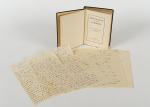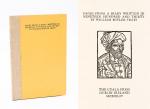52. Viereck, George Sylvester / [Frederick Franklin Schrader] / [Mentioning of Oscar Wilde / Lord Alfred Douglas].
Collection of early Manuscript Material (which is a Manuscript Ballad / Poem), a two-page Manuscript Letter (which is a MLS mentioning Oscar Wilde, Lord [Alfred] Douglas, Viereck’s literary tastes etc.) and the personal copy of “House of the Vampire”, all by the controversial german-american author George Sylvester Viereck. The collection includes: 1. One six-page, hitherto unpublished Manuscript – Ballad [Poem], called “Die Ballade vom Sündigen Glück” [Translates: “The Ballad of sinful Pleasure”]/ 2. A lengthy and extremely insightful Two-Page Manuscript Letter, signed in New York, 1902, which accompanied and talks about the enclosed Six-Page Manuscript – Ballad [The letter and Poem was not conclusively but very likely addressed by Viereck to Frederick Franklin Schrader, then editor of the New York Dramatic Mirror and shortly thereafter co-founder with George Sylvester Viereck of “The Fatherland” / 3. The collection also includes Viereck’s personal copy of his publication “The House of the Vampire” with handwritten, manuscript entry of his name, address in New York City as well as a pasted statement on the endpaper by the author Viereck: “Concerning “The House of the Vampire” : This book went through several editions when it was first published and was dramatized. It played for eight weeks in New York and for two years on the road under the management of the Shuberts. Critics have compared it to such books as Dr.Jekyll and Mr.Hyde, Lady Into Fox, and Dorian Gray”]. The two-page letter is of great value and touches on Viereck’s admiration for Schrader and his “Blatt” [Newspaper]. Viereck is advertising himself to Schrader by introducing himself as a critical admirer with substantial references (Viereck details his working for numerous newspapers in America). Viereck mentions his secessionist tendencies and name-drops Oscar Wilde, Rosetti and Lord Douglas (whom he claims to know personally). This amazing, autographed/signed Manuscript-Material was created by Viereck directly during his transition from writer to propagandist and is an example of his early, bullish personality, which wants to be heard, which needs attention and it is here, in 1912, where his career begins to develop. This large Archive of manuscript material [8 pages in total] is stunning and unpublished (see partial Transcription of the original german material on our website). Viereck’s close friends included Nikola Tesla and even Theodore Roosevelt was among his acquaintances.
New York, Moffat, Yard & Company, 1902-1912. Play and Letters: 20.3 cm x 25.3 cm / Book: 13 cm x 19,5 cm. Pagination: Balld (Poem): 6 pages / Manuscript Letter (MLS): 2 pages / Book: 190 pages. Original Hardcover / Blue publisher’s cloth with gilt lettering on spine in protective collector’s mylar / The play protected in clear folder. The manuscript pages overall in excellent condition besides page IV of the play which has two abrasions with small parts of the text missing only. The book in excellent condition with only minor signs of external wear. Viereck’s usual vanity made him add the lovely littel note of critical success. The personal copy of this controversial author’s most interesting book is a unique possibility for each collector of unusual Vampire material. Extraordinary collection !












